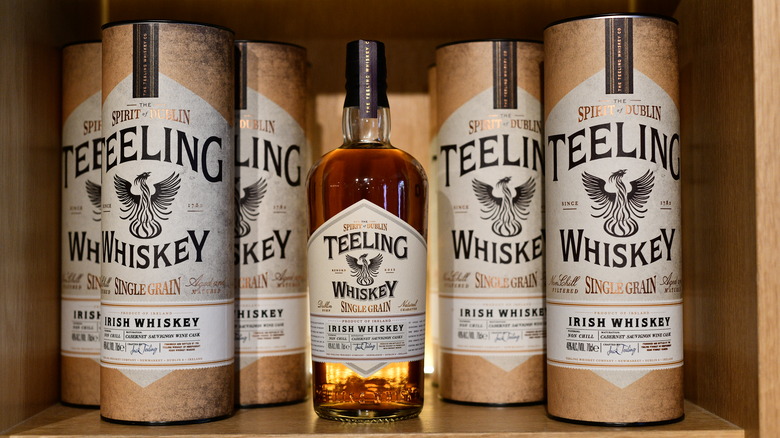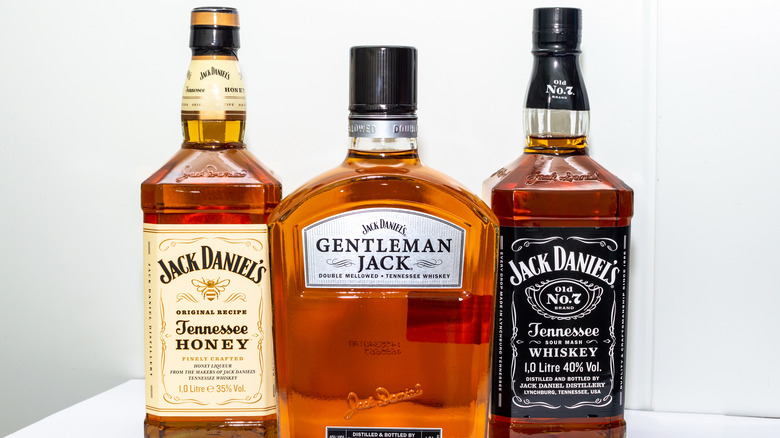The Flavor Difference Between Irish And Tennessee Whiskey
Whiskey is an alcohol made by distilling a fermented grain mash, and the broadness of that definition is what allows so many different varieties to flourish. Depending on the grains used, which could be anything from corn to rye to barley (malted or unmalted), the flavor profile of the spirit will turn out completely different. And it's not just the grains that make the difference — the amount of time a whiskey spends aging has a huge impact, as does the type of barrel it is aged in.
Two popular varieties of whiskey are Irish whiskey and Tennessee whiskey. As indicated by their names, both of these well-respected categories must be produced regionally, and each comes with its own particular set rules and regulations to assure quality and authenticity. For those of us who are mostly interested in their differences in flavor, Irish whiskey will tend towards light, bright, and fruity notes, while Tennessee whiskey will usually be sweeter with more of a rich, heavy, vanilla-forward flavor profile. These are only general descriptions, though, and it's worth it to get more familiar with both whiskeys and understand what makes them distinct.
Irish whiskey is slightly fruity
The most common grain used to make Irish whiskey is unmalted barley, though the grain mash is often blended and may include malted barley, wheat, or corn. Whiskeys made from only malted barley and produced by a single distillery are called "single malt." Unmalted barley imparts fruity flavors like lemon and green apple to the alcohol, while malted barley provides nutty, toasty notes that really bring out the flavor of the grain base. Irish whiskey's close cousin is Scotch whiskey, which uses malted barley and has a smoky, peaty burn that Irish whiskey lacks.
After fermentation, the grain mash used to make Irish whiskey is triple-distilled, which makes it smoother than many other whiskeys. It is then aged for at least three years, as mandated by Irish law. Either new or used whiskey barrels can be used for aging, but Irish whiskey is frequently aged in oak barrels previously used for bourbon. It doesn't get as much of that oaky vanilla flavor that you taste in bourbon, so the flavor of the unmalted barley isn't overpowered.
Of course, the flavor of Irish whiskey varies from brand to brand and bottle to bottle, but you can expect fruity and cereal grain notes with a touch of caramel. The whiskey is smooth and enjoyable on the rocks, straight up, or mixed into cocktails and coffee.
Tennessee whiskey has notes of caramel
Unlike Irish whiskey, Tennessee whiskey uses a corn foundation similar to bourbon, and is required to have a grain mash composed of at least 51 percent corn. Interestingly, we have Irish monks to thank for Tennessee whiskey, as they brought their distilling techniques to the United States. Since corn grows in abundance in America, Tennessee distillers began using it as a cheap alternative to other grains, but quality Tennessee whiskey is anything but cheap and full of shortcuts.
Since corn is a more neutral base than choices like rye or barley, Tennessee whiskey takes on more of the flavor of the new, charred oak barrels it's aged in. This gives it more of a vanilla and caramel flavor profile, similar to bourbon. The whiskey also goes through a unique charcoal filtration step called the Lincoln County process, which gives it a smoother flavor. Before aging, the alcohol is steeped or filtered using maple charcoal chips, for a mellower profile.
Tennessee whiskey does not require a specific aging period, though it is generally aged for at least two to four years. The biggest traits that distinguish the flavor of Tennessee whiskey from the Irish kind is the corn base and charred barrels, which make it sweet and sippable. The unique filtration process removes any harsh notes, but still leaves behind a hint of charcoal. With this info at hand, you'll have an easier time seeking out a whiskey that you personally love.



